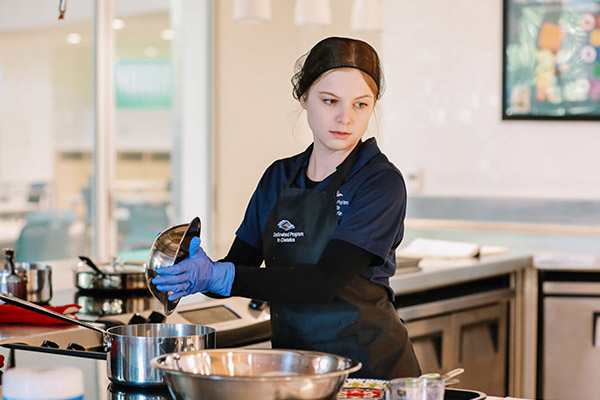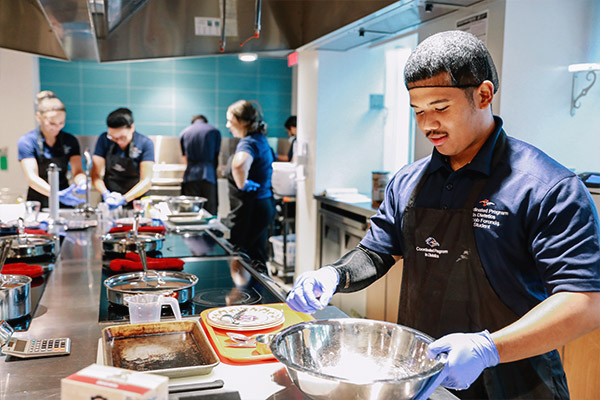
Nutrition and Dietetics Scholarships
Students are encouraged to apply for scholarships available from UT San Antonio, the Academy of Nutrition and Dietetics (AND), and the Texas Academy of Nutrition and Dietetics (TAND). UT San Antonio's federal school code is 010115. For information about scholarships sponsored or administered directly by the University visit the UTSA Scholarship Office.
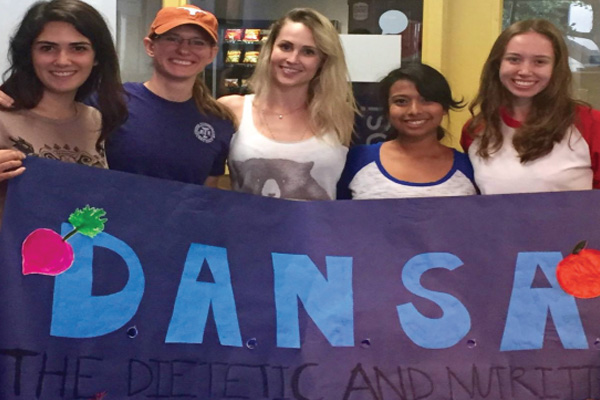
Dietetic and Nutrition Student Association (DANSA)
DANSA is designed for students in the Coordinated Program in Dietetics and it aims to develop leadership skills by promoting student involvement in pre-professional and leadership activities pertaining to nutrition and dietetics. Follow us on Facebook to find out more.
Community Partnerships
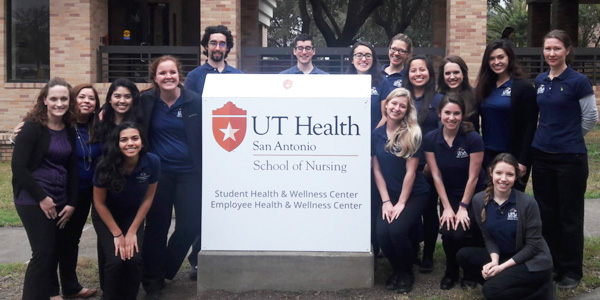
UT Health San Antonio School of Nursing Center for Simulation Innovation
Students are trained to conduct medical nutrition therapy by use of a high-fidelity mannequin.
UT Health San Antonio School of Nursing and University of Texas (UT) at Austin College of Pharmacy and UT Health San Antonio School of Medicine
Interprofessional training provides an environment where students from three different disciplines will collaborate and learn from each other by presenting and discussing case studies using an interprofessional approach, towards improving their understanding of each other’s roles within the healthcare team, promoting future collaboration, and ultimately improving care delivery.
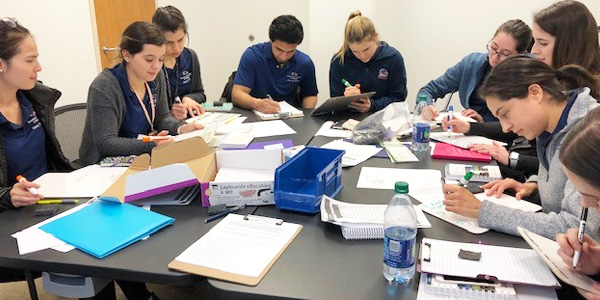
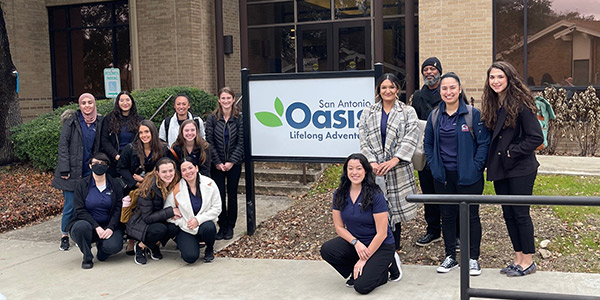
San Antonio Oasis- Student Interprofessional Education
UT Health Pharmacy and Dietitian Students will provide training to Oasis participants on common foods and dietary supplements that can interact with prescription medications.
UT Health San Antonio School of Nursing Caring for the Caregiver Program Skills Team
Nutrition Management Training for caregivers to improve the quality of life for family caregivers and those they care for with evidence-based services, support, and education.
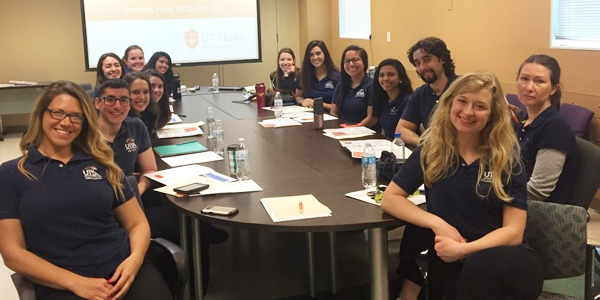
Verification Statement
Requirements for students to receive the verification statement
The dietetic student will be expected to demonstrate core knowledge and entry-level competency (see definition below) in nutrition and dietetics by successfully fulfilling the course and experiential requirements defined by the Coordinated Program in Dietetics, in accordance with UTSA, CDR, and ACEND policies.
Entry-level competence is defined as: a set of specific knowledge, ability, skills, and values; behaviors expected of a practitioner (during the first 3 years of practice); and the minimum level of performance requiring speed and accuracy consistent with providing optima service or care to patients or clients. (Ref. 2022 ACEND CP Standards, https://www.eatrightpro.org/acend/accreditation-standards-fees-and-policies/2022-standards-and-templates)
To be eligible for the Registration Examination, the student must have:
- met the learning outcomes for the courses (or equivalent) in the curriculum, by earning a grade of "C" or above;
- attained the competencies outlined for the supervised practice with average scores of 2 or above;
- graduated with a 3.0 GPA;
- earned a Master of Dietetics Studies.
Upon successful fulfillment of all program requirements described above, the student will receive a verification statement upon completion of the MDS degree. Students will be recommended to CDR to write the registration examination in dietetics. The verification statement will be presented to the student immediately after graduation. Students may request mailing of the statement if not present at graduation. Copies of verification records will be kept on file in the Dietetics Director’s office indefinitely and will be available to former students upon request.
Costs of Attendance & Program Related Fees
Undergraduate Students
| Full-time undergraduate resident student | Living at home w/parents | Living off-campus | living on campus |
|---|---|---|---|
| Tuition & fees (based on 15 hours per term) | $10,966 | $10,966 | $10,966 |
| Books (based on 15 hours-5 classes) | $1,000 | $1,000 | $1,000 |
| Housing & meals (average) | $4,212 | $9,972 | $12,934 |
| Transportation (average) | $2,688 | $3,308 | $696 |
| Personal/Misc. | $1,476 | $2,052 | $2,088 |
| Loan fees | $68 | $68 | $68 |
| Total estimated cost of attendance | $20,410 | $26,352 | $7,752 |
Full Time Undergraduate non-resident student tuition & fees = $25,154. All other charges remain the same.
Graduate Students
| Full time graduate resident student | Living at home w/parents | Living off-campus | living on campus |
|---|---|---|---|
| Tuition & fees (based on 9 hours per term) | $9,362 | $9,362 | $9,362 |
| Books (based on 9 hours-3 classes) | $1,200 | $1,200 | $1,200 |
| Housing & meals (average) | $4,212 | $9,972 | $12,934 |
| Transportation (average) | $2,688 | $3,308 | $696 |
| Personal/Misc. | $1,476 | $2,052 | $2,088 |
| Loan fees | $68 | $68 | $68 |
| Total estimated cost of attendance | $19,006 | $25,962 | $26,348 |
Full Time Graduate non-resident student tuition & fees = $25,964. All other charges remain the same.
Additional Program Related Expenses
- Food Protection Management Certification ~$150
- Professional Liability Insurance $38
- CPR Certification- $25-$30
- Hepatitis B Immunization – $145
- TB Testing – $35 (annual)
- Flu Shot (annual)- up to $45 off-campus (lower fee through Student Health Services)
- COVID 19 testing (if required by site)
- Criminal Background Check – $45 (annual)
- Student Membership in the Academy of Nutrition and Dietetics – $58
- Student Membership in the Dietetic Student Association $20
- Face mask (if required by site) $8-$15
- Face shield (if required by site) $8-$15
- Lab Coat for Clinical Rotations $12/varies* (if required by site)
- Practicum Uniform:
- Polo (program logo) ~$45; Black Slacks ~$20; Black Non-Slip Shoes ~$25 (varies)
- Drug Screening- $30-$40 varies*
- Program Service Fee $75 per semester (effective fall 2019)
- Practicum site parking pass varies*
- Transportation to supervised practice sites (gas) varies*
- Transportation to professional meetings and/or volunteer opportunities (gas) varies*
** Price may vary. Estimated cost for criminal background check, CPR, liability insurance, and possibly drug testing.
¥ Estimated cost for criminal background check, liability insurance, and possibly drug testing.
Preceptors
Training and Professional Development

Online Dietetic Preceptor Training Module
The Commission on Dietetic Registration offers a free Online Dietetic Preceptor Training Module worth 8 CPEUs.
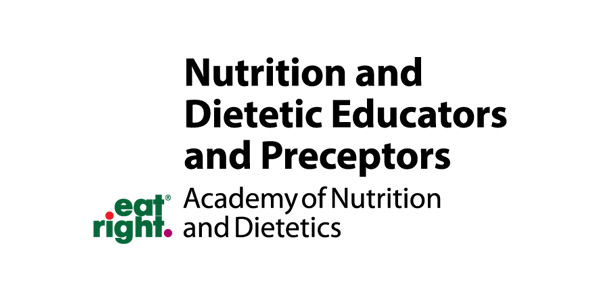
Join Nutrition & Dietetic Educators & Preceptors
Nutrition and Dietetic Educators and Preceptors is an organizational unit within the Academy of Nutrition and Dietetics. NDEP's mission is to advocate for and empower educators and preceptors to lead the profession of nutrition and dietetics.
What our interns say about their preceptors:
- “I greatly enjoyed this rotation. Ms. Cervantes changed my view of long-term care. She was an excellent preceptor.”
– Intern, Morningside Ministries - “AMAZING preceptors that give me their time to help me learn and succeed.”
– Intern, Methodist Transplant and Specialty Hospital
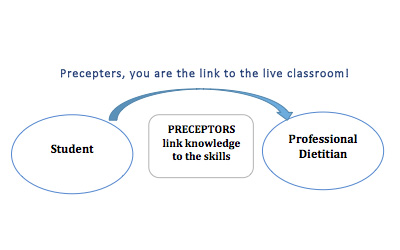
“This was a great environment for learning food service management. I feel more confident in knowing all that kitchen management involves after this experience.”
- “She encouraged independent work, but was always available for any questions, concerns or issues.”
– Intern, Methodist Hospital - “Ms. Paras and Ms. Palma are wonderful educators. They provided a rich learning environment and encouraged me to seek out knowledge. The rest of the CHEF team is wonderful as well.”
– Intern, Culinary Health Education for Families (CHEF), The Children’s Hospital of San Antonio - “She was a great mentor and always offered a lot of insightful and useful advice.”
– Intern, Texas ArgLife Extension Services - “It was such a good opportunity to have a NICU and Pedi rotation. All the RD’s were invested in my learning progress.”
– Intern, University Hospital

